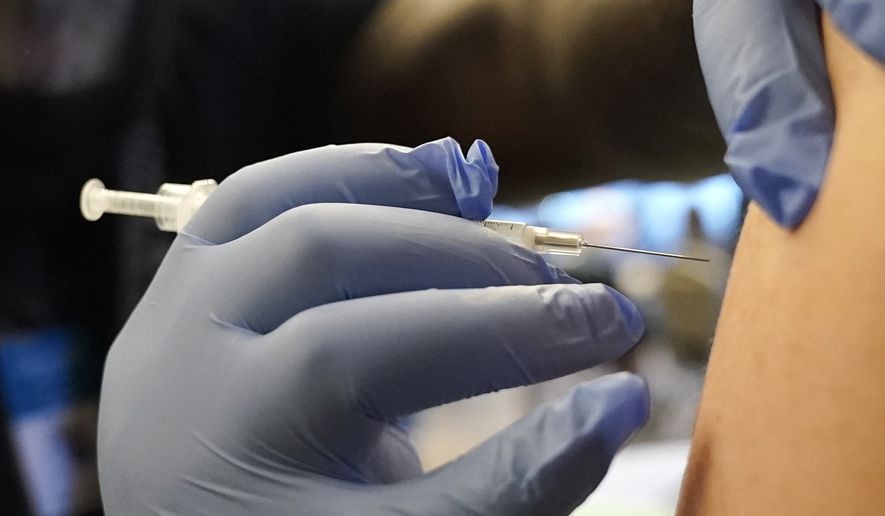America’s bigger businesses are now required to know their employees’ coronavirus vaccination status and should be demanding mandatory mask-wearing of those who haven’t received the shots after the Biden administration’s most expansive vaccine mandate took effect Monday.
The Occupational Safety and Health Administration has promised a light touch on enforcement for now. As long as businesses are making “good faith” efforts, they won’t be penalized for another month or so, when mandatory testing goes into effect for the unvaccinated, OSHA said.
The Supreme Court is deliberating on whether OSHA’s policy is legal and could announce a ruling at any moment.
Meanwhile, businesses say they are caught between an overbearing government and reluctant workers.
“The rule is currently in effect nationwide,” said a statement by the Labor Department, which oversees OSHA.
Businesses with at least 100 workers — about two-thirds of the private-sector workforce — must have a roster of who has received vaccines and who hasn’t.
Businesses that do not want to enforce a vaccine mandate must have a masking requirement. As of Feb. 9, they also will have to test employees weekly for COVID-19. Businesses will have to maintain records of the test results.
Business groups have predicted major disruptions in some workforces. They hope the Supreme Court will step in quickly and grant a nationwide reprieve.
The justices heard oral argument on Friday.
“We made the case we really need to know soon,” said Karen Harned, executive director of the Small Business Legal Center at the National Federation of Independent Business. “This uncertainty is just not good for small business when they’re dealing with everything else.”
During oral argument, the justices appeared to be sparring among themselves over whether to issue a stay of the OSHA rules while they consider the bigger legal ramifications.
Justice Stephen G. Breyer suggested that any delay would result in more sickness and death.
“If we delay it a day, and if it were to have effect, then 750,000 more people will have COVID who otherwise, if we didn’t delay it, wouldn’t have?” he said.
Solicitor General Elizabeth Prelogar, arguing the case for the Biden administration, said the pandemic has reached “a truly grave danger.”
The National Federation of Independent Business said the danger is that employees will quit as soon as businesses put their vaccine or masking plans in place.
Arkansas Gov. Asa Hutchinson, a Republican, told CNN’s “State of the Union” on Sunday that he doesn’t expect his state’s businesses to comply yet.
“They should wait until they get the Supreme Court decision,” he said.
Iowa, one of 22 states that operate their own OSHA-approved plans policing workplace safety, said it will not enforce the administration’s mandate.
“We are going to continue to protect the freedoms and liberties of Iowans,” said Gov. Kim Reynolds, a Republican. “The Biden administration continues to ignore the constitutional rights afforded to all Americans, which our country was built on. Instead, they’d rather dictate health care decisions and eliminate personal choice, causing our businesses and employees to suffer and exacerbating our workforce shortage.”
It’s not clear how that will square with the federal mandate.
OSHA has indicated that businesses that make serious efforts to persuade employees to vaccinate, but still have 5% or so of their workforce resist, will likely be safe from penalties.
Enforcing masking and testing mandates seems trickier, particularly because of an apparent shortage of tests as the omicron variant rapidly spreads.
Violations of OSHA rules can cost employers up to $13,653 per day. Willful or repeated violations can cost 10 times that.
Employers are not liable for workers who lie about their status, but they can be cited if they know an employee is using a bogus vaccination record.
Even some of the government’s sponsored businesses — the U.S. Postal Service and Amtrak — have said they doubt they will be able to comply with the mandate.
The post office asked OSHA for a 120-day delay in complying with the mandate.
Chief Justice John G. Roberts Jr. suggested that wasn’t a convincing reason to nix the whole plan.
“Well, just because the post office can’t do it efficiently doesn’t mean that private industry can’t,” he said.
Still, he and other Republican-appointed justices were skeptical of OSHA’s power to operate in this area without more authority granted by Congress.
The big-business mandate is one of a network of requirements that the Biden administration has imposed in recent months.
Others include a vaccination requirement for federal employees, one for federal contractors and one for health care providers that receive federal funding. That latter rule covers about 10 million employees.
Some courts have delayed the federal contractor mandate, and some states have blocked the medical worker mandate, which is to be phased in over the next two months.
The justices heard arguments over the medical worker policy on Friday, along with the OSHA rule.
For more information, visit The Washington Times COVID-19 resource page.
• Stephen Dinan can be reached at sdinan@washingtontimes.com.




Please read our comment policy before commenting.